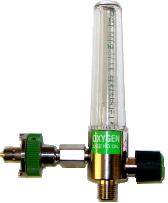In support of Hugo's response, Keep It Safe and Simple (and
cheap) - The KISS formula.
Taught to every first year engineering
student.
The metre shown below is dead easy to use (no
pun intended). There is a little black ball that floats up the graduated
glass tube. You want 4 litres? Turn the little knobby until the black
ball floats up to "4" and, well, breathe.
Air fouled in the cabin? Slip an oral/nasal
mask onto the nipple that screws onto the threaded fitting at the bottom.
The nipple costs, oh, about $0.25 USD :-) I'm sure
they'll throw that in. The metre too far from the
cockpit seat for the mask? Run an 02 extension line (about
$1.00) from the flowmetre to the instrument panel. Plug your mask in
there. Hell, forget the buck - I'll acquire
one for you and mail it to you.
Broken? Unscrew it by hand from your wall
mount. Really broken? Replace it for $51 USD.
No computer, no electronics, no power supply, no
software failures, NADA NADA NADA.
Enjoy
Rick L
Vancouver
Oxygen Flowmeter
These
precision Medical Flowmeters are available in both a rugged chrome plated brass
and an aluminum body model. Features a 0-15 LPM flow rate, Lexan flowtube
and positive shut-off control valve that will not drift from a set flow rate
over extended durations. [More Info]
----- Original Message -----From: Hugo MarreroSent: Monday, December 19, 2005 11:49 AMSubject: RE: [PSUBS-MAILIST] o2 controlHey guys,I assume that just about everyone here is limited in funds to build your sub. The more complex systems are their likelihood to fail is higher and the cost of repair is equally expensive. An O2 System does not have to be so complex, all you need is a needle valve in series with a flow gauge (calibrated for O2) for you to set the proper flow. There are all kinds of portable O2 monitors that you can get for $200 bucks and that is what you use to keep an eye on your O2. They even have Low and high and low level alarm settings which if set properly will give you plenty of time to adjust your O2 flow.In my personal experience with many submersibles I have yet to see an automatic computer-controlled O2 system aboard any of the submersibles that I have worked with. And the comments I have heard from the ones that do have it is that they are a pain in the ass to maintain. I am not against it as I am a tech junkie myself. However one must ask the question..... Is this really necessary? Do I really need it? Or is it just a gadget I like?The JSL sphere is roughly 55 cuft and I rarely ever have to make an adjustment to the O2 system. I have even turned off the O2 to see how long it takes to trigger a low alarm (Ours is set at 19%) and it takes about 30 minutes to drop 2%. However, it is a good piloting practice to monitor your instruments constantly (every 5 minutes is a good ballpark figure). I guarantee that this practice alone will keep you out of trouble and on top of your life support system with very little maintenance..Any ways, just a thought...Hugo-----Original Message-----
From: rick miller [mailto:rickm@pegasuscontrols.com]
Sent: Monday, December 19, 2005 1:22 PM
To: personal_submersibles@psubs.org
Subject: [PSUBS-MAILIST] o2 controlbrianthe sensors that you are looking for are teledyne analytical instrumentsclass r-22d, o2 sensors. they put out a milli volt singal directly perporsional to the amount of o2 present the average output is 7-13 mv in air at stp. the need to be loaded with a 10k resister. Measure the output with a milli volt meterany kind will do. if the voltage drops ten percent you know that your o2 levels droped ten percent.o2 control can be done three ways.1.o2 level monitoring with a solinoid for injectionpros hands off automatic controlcons expensive and complex2. automatic pressure controller maintain sub internal pressure to a fixed pointpro single controller all mechaincal/ about half price of electricalcon compressed air leak internal inside sub will shut down system3. adjustable flow controller manualpro cheapestcon requires continous monitoringhope that this helped for your design ideasrick m
